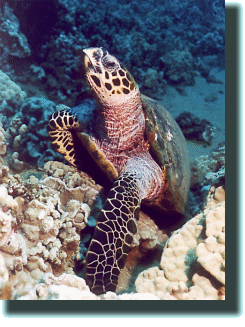Hawksbills, the Archie Carr Refuge, Kemp's ridleys, and coral reefs need your help
 CITES is the Convention on International Trade in Endangered Species, (see www.cites.org), which meets every three years to review the list of protected species. Recently, Cuba circulated a draft proposal to countries bounding the Caribbean that would have asked CITES to downlist the hawksbill turtle so that Cuba can resume limited trade in bekko, or hawksbill shell. We were fortunate enough to obtain copies in both English and Spanish.
CITES is the Convention on International Trade in Endangered Species, (see www.cites.org), which meets every three years to review the list of protected species. Recently, Cuba circulated a draft proposal to countries bounding the Caribbean that would have asked CITES to downlist the hawksbill turtle so that Cuba can resume limited trade in bekko, or hawksbill shell. We were fortunate enough to obtain copies in both English and Spanish.
The deadline for filing amendment proposals was November 12. Cuba filed not one, but two separate amendments. The first proposal (11.40), in which they have been joined by Dominica, is essentially the same proposal that was circulating before November 12.
The second proposal (11.41, filed alone) requests a one-time downlisting to allow the transfer of up to 6900 kilograms of hawksbill shell already stockpiled. Since CITES voted to allow a similar limited ivory transfer at COPS 10 three years ago, this request would seem to have a much better chance of passing than the permanent downlisting requested in the first proposal (11.40).
Studies indicate that hawksbill turtles do not reach breeding age until they are 20 years old or more. (Cuba contests this, however, citing unpublished data of the Cuban Fisheries Ministry.) Additionally, breeding hawksbill females do not nest every year. The hawksbill turtle has not been studied long enough to observe more than two generations, at most. It is therefore not yet possible to understand the impact of allowing even a small harvest such as Cuba proposes, but existing science does show clearly that the hawksbill population is in serious decline. (Cuba also contests this, rejecting current studies and initiating its own population survey.)
Dr. Karen Bjorndal, of the Archie Carr Center for Sea Turtle Research and the Department of Zoology at the University of Florida, recently wrote an excellent introduction for a special hawksbill edition of Chelonian Conservation and Biology. Her article clearly outlines the status of the hawksbill and the reasons why downlisting is dangerous and unsupported by existing science.
Your help is needed to defeat both of these proposed amendments. You can find out who your country's CITES Authority is by visiting:
http://www.cites.org/CITES/english/direct/direct.shtml
Once you have the contact information for your CITES Authority, please take the time to urge that your country's delegation oppose the Cuban amendments at COPS 11 in Nairobi, Kenya.

|
We believe that the existing studies of hawksbill population dynamics strongly indicate that downlisting is inappropriate and dangerous to the continued existence of the Caribbean hawksbill.
64K JPEG
|
Watch this page for more information and things you can do to help.
The following is an appeal for help posted to the CTURTLE mailing list on October 6, 1999, by the Caribbean Conservation Corporation.
We reported to you earlier that almost $3 million requested by the Clinton Administration and the US Fish and Wildlife Service for land acquisition in the Archie Carr Refuge has been cut from the Presidents's budget and is not in the US Senate or House budget bills. The money would have gone towards the acquisition of key parcels in the central portion of the refuge, many of which have willing sellers.
Since our last posting Senators Bob Graham and Connie Mack from Florida, who have now heard from many people on the issue, have spoken up for the refuge on the floor of the Senate. In a recent debate senator Graham stated "we feel that the Archie Carr Refuge is a key priority for Florida." Senator Gorton, who heads the appropriations committee, responded with, "the committee shares your view that the protection of the loggerhead sea turtle is critical. We will consider the needs of the Archie Carr Refuge during our conference with the House."
With your help, we have succeeded in getting the refuge back on everyone's radar screens! It is essential to now make sure legislators agree on funding for the refuge.
There is still time to influence the process, as both the House and Senate still need to come together in a "conference committee" to agree on a joint budget bill. This will occur in mid October. Consequently, unless we can convince some key Senators or Representatives to come to bat for the refuge during the conference committee process, there will be no badly needed federal dollars this year. A coalition of sea turtle protection groups has rallied to try to convince the US Congress to reinstate the funding (The coalition includes Caribbean Conservation Corporation, the Center For Marine Conservation, Sea Turtle Preservation Society, and Friends of the Carr Refuge).
Senator Bob Graham, Senator Connie Mack, Representative Dave Weldon, and Representative C.W. Young are all Florida congressmen that are key players in the refuge funding issue. They must be convinced to put their heads together to reinstate funding for the Archie Carr Refuge. Additionally, Senator Slade Gorton heads up the Senate Appropriations Committee , while George Frampton of the Council on Environmental Quality will represent the administration during budget negotiations. They must all be contacted and asked to support funding that will be pushed by Senator Graham and Senator Mack. This strategy will only work if they hear from enough people. You can help in this effort by contacting these congressmen, and any other members of the Florida congressional delegation. Let them know you are disappointed and that you are depending on them to find the money for the refuge. Faxes, letters, and personal phone calls are preferred. Multiple contacts are also effective, an initial phone call to a key environmental staff person followed by a personal letter for example, will get their attention.
Below is the contact information. Most of these congressmen, such as Senator Graham and Senator Mack, have been very supportive of the Carr Refuge in the past. So it is appropriate to thank them for their past support. Stress that now is not the time to abandon the refuge. The problem is they were not vocal supporters this year!! You must act as soon as possible in order to be effective.
Thanks for your help!!!
- Senator Bob Graham (strong refuge supporter in the past- his support now
is essential)
Phone-202-224-3041
Fax-202-224-2237
bob_graham@graham.senate.gov
524 Hart Senate Office Building
Washington DC, 20510
- Senator Connie Mack
Phone-202-224-5274
Fax-202-224-8022
connie@mack.senate.gov
517 Hart Senate Office Building
Washington DC, 20510
- Representative Dave Weldon (represents the Carr Refuge area)
Phone-202-225-3671
Fax-202-225-3516
fla14@mail.house.gov
332 Cannon House Office Bldg
Washington DC, 20515
- Representative C.W. Young (Chairman of House Appropriations Committee-he
will only support the refuge appropriation if the above three are on board
and request funding. He must hear from Rep.Weldon.)
Phone-202-225-5961
Fax-202-225-9764
2407 Rayburn House Office Bldg
Washington DC, 20515
- Senator Slade Gorton (Chairman, Senate Appropriations, must be convinced
by Graham and Mack)
Phone-202-224-3441
Fax-202-224-9393
730 Hart Senate Office Building
Washington DC, 20510
- George Frampton, Chairman (Will represent the Administration during budget
discussions.)
Council on Environmental Quality
Phone-202-456-6224
Fax-202-456-2710
722 Jackson Place NW
Washington DC 20503
- Senator Robert Byrd (Minority Chairman, Senate Appropriations-he must hear
from Sen. Graham)
Phone-202-224-3954
Fax-202-228-0002
311 Hart Senate Office Building
Washington, DC 20510
- Representative David Obey (Minority Chairman, Appropriations in the House)
Phone-202-225-3365
Fax-202-225-9069
2314 Rayburn Office Building
Washington DC, 20515
- Donald Barry
Phone-202-208-4416
Assisstant Secretary, Fish and Wildlife and Parks
U.S. Department of Interior
1849 C St, NW
Washington, D.C. 20240
For further information, contact:
Caribbean Conservation Corporation
Sea Turtle Survival League
4424 NW 13th Street, Ste A-1
Gainesville, FL 32609
PHONE:(352)373-6441
FAX:(352)375-2449
Email: ccc@cccturtle.org
The Kemp's ridley is the most endangered of all the sea turtle species. Every year during shrimping season, dead Kemp's ridleys wash ashore along Padre Island, Texas--drowned in shrimp nets.
The Sea Turtle Restoration Project (STRP) and Help Endangered Animals-Ridley Turtles (HEART) have launched a national program to gather support for a marine turtle reserve that would be closed to commercial shrimp fishing. They are asking for your support. For details and things you can do to help, please drop by the following sites:
We've been informed that the Republicans in the US Senate have cut all funding for coral reef activities under the Lands Legacy Program. This funding is needed to preserve the health and stability of coral reefs.
Coral reefs are a critical part of the underwater ecosystem. Numerous species, including sea turtles, depend on coral reefs or other species that, in turn, depend on the reefs. Sme of the programs that this cut threatens include attempts to restore injured reefs in Puerto Rico, Florida, Hawaii and U.S. territories, and development of a coral nursery to grow donor material for restoration projects.
You can help by phoning, writing, faxing, or sending email to the senators involved. You can find all the information you need to do this at The Electronic Activist.
The effort to restore this funding is led by Senator Daniel Inouye of Hawaii. Please copy him on any correspondence.
 Turtle Trax Home Page
Turtle Trax Home Page
Last modified 00/04/01
Send comments or corrections to webmaster@turtles.org
 CITES is the Convention on International Trade in Endangered Species, (see www.cites.org), which meets every three years to review the list of protected species. Recently, Cuba circulated a draft proposal to countries bounding the Caribbean that would have asked CITES to downlist the hawksbill turtle so that Cuba can resume limited trade in bekko, or hawksbill shell. We were fortunate enough to obtain copies in both English and Spanish.
CITES is the Convention on International Trade in Endangered Species, (see www.cites.org), which meets every three years to review the list of protected species. Recently, Cuba circulated a draft proposal to countries bounding the Caribbean that would have asked CITES to downlist the hawksbill turtle so that Cuba can resume limited trade in bekko, or hawksbill shell. We were fortunate enough to obtain copies in both English and Spanish.

 Turtle Trax Home Page
Turtle Trax Home Page